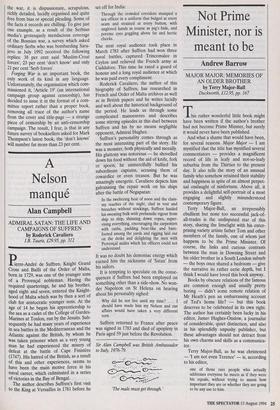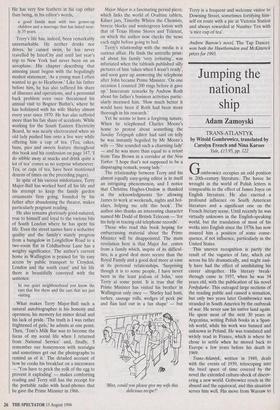Not Prime Minister, nor is meant to be
Andrew Barrow
MAJOR MAJOR: MEMORIES OF AN OLDER BROTHER by Terry Major-Ball Duckworth, £12.95, pp. 167 This rather wonderful little book might have been written if the author's brother had not become Prime Minster, but surely it would never have been published.
And what a shame that would have been, for several reasons. Major Major — I am mystified that the title has mystified several commentators — provides a magnificent record of life in leafy and not-so-leafy suburbia from the Thirties to the present day. It also tells the story of an unusual family who somehow retained their stability and happiness in spite of an almost perpet- ual onslaught of misfortune. Above all, it provides a delightful self-portrait of a most engaging and slightly misunderstood contemporary figure.
Terry Major-Ball, an irrepressibly ebullient but none too successful jack-of- all-trades is the undisputed star of this story, sharing the limelight with his enter- prising variety artiste father Tom and other members of the family, one of whom just happens to be the Prime Minister. Of course, the links and curious contrasts between the man in Downing Street and his older brother in a South London suburb — the boys once shared a bedroom — give the narrative its rather eerie depth, but I think I would have loved this book anyway.
Books by obscure relations of the famous are common enough and usually pretty boring — didn't some remote relation of Mr Heath's pen an embarrassing account of Ted's home life? — but this book deserves to be celebrated in its own right. The author has certainly been lucky in his editor, James Hughes-Onslow, a journalist of considerable, quiet distinction, and also in his splendidly unpushy publisher, but these advantages should not detract from his own charms and skills as a communica- tor.
Terry Major-Ball, as he was christened — 'I am not even Terence' — is, according to his editor,
one of those rare people who actually addresses everyone he meets as if they were his equals, without trying to assess how important they are or whether they are going to be any use to him.
He has very few feathers in his cap other than being, in his editor's words, a good family man with two grown-up children and a marriage that has lasted near- ly 35 years.
Terry's life has, indeed, been remarkably unremarkable. He neither drinks nor drives, he cannot swim, he has never travelled by InterCity and until last year's trip to New York had never been on an aeroplane. His chapter describing that amusing jaunt begins with the beguilingly modest statement, 'As a young man I often wanted to go to Heathrow.' Like his father before him, he has also suffered his share of illnesses and operations, and a perennial back problem even once threatened his annual visit to Bognor Butlin's, where he has holidayed with his wife Shirley almost every year since 1970. He has also suffered more than his fair share of accidents. While working for the South Eastern Electricity Board, he was nearly electrocuted when an old lady pushed him onto a live wire while offering him a cup of tea. (Tea, cakes, buns, pies and sweets feature throughout this book and his confession on page 147, 'I do nibble away at snacks and drink quite a lot of tea' comes as no surprise whatsoever. Tea, or cups of tea, have been mentioned dozens of times on the preceding pages).
In spite of his various misfortunes, Terry Major-Ball has worked hard all his life and his attempt to keep the family garden ornaments firm going, founded by his father after abandoning the theatre, makes particularly poignant reading.
He also remains gloriously good-natured, true to himself and loyal to the various bits of South London where he has spent his life. Even the street names have a seductive quality and the family's stately progress from a bungalow in Longfellow Road to a two-room flat in Coldharbour Lane has a weighty significance. The author's current home in Wallington is praised for 'its easy access by public transport to Croydon, London and the south coast' and his life there is beautifully conveyed with the sentence:
In our quiet neighbourhood you know the cars that live there and the cars that are just visiting.
What makes Terry Major-Ball such a natural autobiographer is his honesty and openness, his memory for minor detail and his lack of pride. 'The truth is I was rather frightened of girls,' he admits at one point. Then, 'Toni's Milk Bar was to become the focus of my social life when I returned from National Service' and, finally, 'I remember our honeymoon with nostalgia and sometimes get out the photographs to remind us of it.' The detailed account of how he cooks his breakfast on a microwave — 'You have to prick the yolk of the egg to prevent it exploding' — makes comforting reading and Terry still has the receipt for the portable radio with head-phones that he gave the Prime Minister in 1966. Major Major is a fascinating period piece, which links the world of Ovaltine tablets, Kilner jars, Timothy Whites the Chemists, breeze blocks and wintergreen lotion with that of Texas Home Stores and Teletext, on which the author now checks the news each night before going to bed.
Terry's relationship with the media is a curious affair. He finds the untruths print- ed about his family 'very irritating', was infuriated when the tabloids published silly pictures of him 'taken when I wasn't ready', and soon gave up answering the telephone after John became Prime Minister. 'On one occasion I counted 200 rings before it gave up.' Inaccurate remarks by Andrew Roth about his father's business activities partic- ularly incensed him. 'How much better it would have been if Roth had been more thorough in his research.'
Yet he seems to have a forgiving nature, When he telephoned Charles Moore's home to protest about something the Sunday Telegraph editor had said on telly he was instantly beguiled by Mr Moore's wife — 'She sounded such a charming lady' — and he was more than equal to a retort from Tina Brown in a corridor at the New Yorker. 'I hope that's not supposed to be a disparaging remark, young lady.'
The relationship between Terry and his almost equally easy-going editor is in itself an intriguing phenomenon, and I notice that Christina Hughes-Onslow is thanked in the acknowledgments 'for allowing James to work at weekends, nights and hol- idays, helping me edit this book'. The author also thanks an interesting character named Mr Dodd of British Telecom — 'for his help in tracing old telephone records'.
Those who read this book hoping for embarrassing material about the Prime Minister will be disappointed. The main revelation here is that Major Jnr. comes from a family which, inspite of its difficul- ties, is a good deal more secure than the Royal Family and a good deal more at ease in its personal relationships. 'Surprising though it is to some people, I have never been in the least jealous of John,' says Terry at some point. It is true that the Prime Minister has visited his brother in Wallington only once — 'Shirley had ham, turkey, sausage rolls, wedges of pork pie and flan laid out in a fan shape' — but Miss, could you please give my wife this delicious recipe?' Terry is a frequent and welcome visitor to Downing Street, sometimes fortifying him- self en route with a pie at Victoria Station and always rewarded at Number Ten with 'a nice cup of tea'.
Andrew Barrow's novel, The Tap Dancer, won both the Hawthomden and McKitterick prizes for 1993.











































 Previous page
Previous page